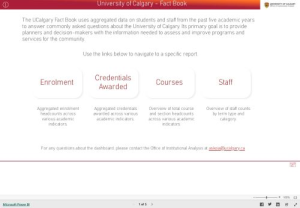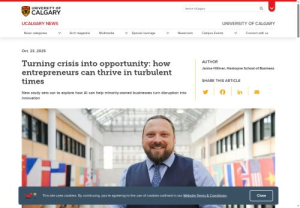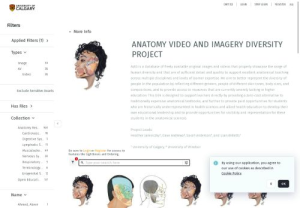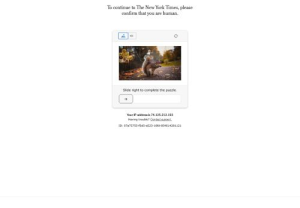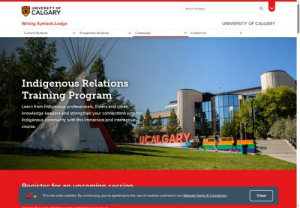Showing bookmarks tagged with: calgary
Clear
Classroom Search Tool | Calendar and Scheduling | University of Calgary
https://ucalgary.ca/student-services/calendar-scheduling/general-assignment-rooms/classroom-search-tool
Welcome to the University of Calgary Classroom Search Tool! This tool is designed to help users visualize and locate learning spaces on the University of Calgary Main Campus. This tool offers detailed information about all general assignment rooms (centrally-scheduled rooms).
UCalgary Fact Book - OIA
https://app.powerbi.com/view?r=eyJrIjoiNmM1Y2Q4M2YtNzlhZC00OTc5LWJhZjMtNDc3YzI0MTBiYTQxIiwidCI6ImM2MDlhMGVjLWE1ZTMtNDYzMS05Njg2LTE5MjI4MGJkOTE1MSJ9
PowerBI charts and tables for UCalgary data. Staff, students, etc.
Assessment of Student Learning | Taylor Institute for Teaching and Learning | University of Calgary
https://taylorinstitute.ucalgary.ca/assessment-student-learning
Engaging with the UCalgary assessment principles
Selected text
The UCalgary Principles for the Assessment of Student Learning have been developed to support instructors as they design and implement of assessments based on their particular context and expertise.
Consultations have been underway at the governance level for these principles to be endorsed.
This page includes a brief description of links to relevant resources for each principle. The aim of these resources is to highlight current assessment practices and inspire future innovation
UCalgary Assessment Principles Report
https://teaching-learning.ucalgary.ca/sites/default/files/teams/1/Assessment%20Principles/FINAL_AssessmentPrinciples%20Report%5B12%5D.pdf
The Assessment Principles Group (APG) was formed in 2023 to draft institutional Principles for the Assessment of Student Learning, based on input from across the University of Calgary (UCalgary).
Principles for the Assessment of Student Learning will provide a framework to help guide assessment practices, policies, guidelines, procedures, discussions, and decision-making across multiple organizational levels. Consultations with the UCalgary campus community began in the fall of 2024 and occurred over six months. Elder Evelyn Good Striker provided grounding, wisdom and guidance for our processes to help the team move forward in a good way. Over 450 people (staff, students and faculty) engaged in campus conversations, and nearly 900 comments emerged from and were coded from these consultations. Eleven themes emerged from this process including: student learning and growth; curriculum alignment; parallel processes and ethical space; equitable and inclusive; meaningful feedback; clear communication, mental health and wellbeing; academic integrity; educational technologies; continuous enhancement; and resources and support.
Elders Cultural Transfers Video: Reg Crowshoe on Oral Systems
https://yuja.ucalgary.ca/V/Video?v=1149135&node=6380723&a=25634539
Part of the Elders' Wisdom Series. Reg Crowshoe shares teachings about oral systems.
Turning crisis into opportunity: how entrepreneurs can thrive in turbulent times | News | University of Calgary
https://www.ucalgary.ca/news/turning-crisis-opportunity-how-entrepreneurs-can-thrive-turbulent-times
New study sets out to explore how AI can help minority-owned businesses turn disruption into innovation
Anatomy Video and Imagery Diversity Project
https://digitalcollections.ucalgary.ca/avid?FR_=1&W=2560&H=1296
AVID is a database of freely available original images and videos that properly showcase the range of human diversity and that are of sufficient detail and quality to support excellent anatomical teaching across multiple disciplines and levels of learner expertise. We aim to better represent the diversity of people in the population by reflecting different genders, people of different skin tones, body sizes, and compositions, and to provide access to resources that are currently severely lacking in higher education. This OER is designed to support learners directly by providing a zero-cost alternative to traditionally expensive anatomical textbooks, and further to provide paid opportunities for students who are historically underrepresented in health sciences and allied health education to develop their own educational leadership and to provide opportunities for visibility and representation for these students in the anatomical sciences.
Inside Calgary’s Fight Over Fluoride in the Water - The New York Times
https://www.nytimes.com/2025/10/27/world/canada/canada-calgary-fluoride-water.html
We just keep trying with referenda until the desired answer sticks. (which is why the referendum on "should Alberta stay in Canada - just asking questions LOL" is so corrosive.
Calgary’s debate over fluoride has drawn national attention in part because of how far back it goes — there have been seven referendums on the issue since 1957, four of them won by opponents of fluoride and three by supporters.
2025 Alberta Micro-Credential Symposium
https://www.sait.ca/continuing-education/alberta-micro-credential-symposium
Join us for a two-day micro-credential symposium, hosted by the University of Calgary, Mount Royal University, the Southern Alberta Institute of Technology and the Alberta Post-Secondary Institutions.
Indigenous Relations Training Program | Writing Symbols Lodge | University of Calgary
https://www.ucalgary.ca/writing-symbols/community/indigenous-relations
Learn from Indigenous professionals, Elders and other knowledge keepers and strengthen your connections with the Indigenous community with this immersive and interactive course.
Nipa Chakravarti appointed as vice-president (digital transformation and technology) and chief transformation officer | News | University of Calgary
https://www.ucalgary.ca/news/nipa-chakravarti-appointed-vice-president-digital-transformation-and-technology-and-chief
Nipa Chakravarti has joined the University of Calgary as vice-president (digital transformation and technology) and chief transformation officer, bringing more than two decades of senior leadership experience across the energy, utilities, finance and telecommunications sectors.
AI Learning | Artificial Intelligence | University of Calgary
https://ai.ucalgary.ca/learning
- info for students
- info for instructors (but with a learning context)
- a separate AI Teaching section coming soon
Operating Standards: Access & Privacy | University Legal Services | University of Calgary
https://www.ucalgary.ca/legal-services/access-information-privacy/operating-standards-guidelines-forms
Operating Standards
- Equity, Diversity and Inclusion Data Collection Standard
- Correcting Personal Information Standard
- Formal Access Request Procedure
- Procedure for Responding to a Privacy Breach
- Guidelines for Conducting University of Calgary Surveys
- Guidelines for Researchers/Project Leads: Use of Student and Institutional Data (Personal Information)
- Guidelines for the Collection of Personal Information
- Guidelines for the Software Acquisition Process
- Information Security Classification Standard Data Levels Resource
- Seven Tips for Managing Emails
- Privacy Breach Incident Report
- Request to Access a Network without Consent
- Request to Access Information
- Request to Access Personal Information for Research Purposes
- Request to Correct Personal Information
- Reference Consent Form for Employees
- Reference Consent Form for Students
- Designate a Representative or Disclose to Third Party Consent Form
Guidelines
Forms
Indigenous Academic Integrity
https://taylorinstitute.ucalgary.ca/sites/default/files/Content/Resources/Academic-Integrity/21-TAY-Indigenous-Academic-Integrity.pdf
Indigenous communities are fundamentally diverse.
We are unique in our ways of knowing, doing, connecting and learning. There are also relationships between us as nations; by exploring these relationships we can discover themes and parallels in Indigenous paradigms that inform Indigenous ways of academic integrity.
Themes of Indigenous Paradigms
- Indigenous paradigms recognize RELATIONSHIPS
- Indigenous paradigms recognize INTERCONNECTEDNESS
- Indigenous paradigms recognize LAND-BASED KNOWLEDGES
Artificial Intelligence | University of Calgary
https://ai.ucalgary.ca/
Explore UCalgary’s AI teaching, learning and research resources.

